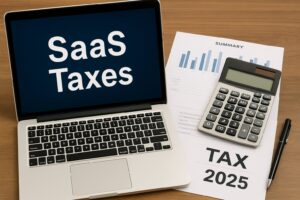
The Tax Challenges Every SaaS Business Must Understand in 2025
As Software-as-a-Service (SaaS) continues to dominate the software delivery model, tax compliance for SaaS businesses has become more complicated than ever. Federal, state, and even international rules create a patchwork of obligations — and failing to comply can result in penalties, audits, and lost revenue.
In this post, we’ll break down the key tax issues every SaaS business needs to address in 2025, and how to prepare your business for success.
🔍 Is SaaS Subject to Sales Tax?
One of the most confusing aspects of SaaS taxation is whether sales tax applies to your product. In the United States, sales tax rules vary by state:
- Some states treat SaaS as a taxable sale of tangible personal property (e.g., New York).
- Others exempt SaaS as a non-taxable service (e.g., California).
- Some states partially tax SaaS if it involves downloadable components.
The U.S. Supreme Court’s Wayfair v. South Dakota decision also means that you may have to collect sales tax in states where you don’t have a physical presence, depending on your sales volume or transaction count (economic nexus).
Understanding Nexus in the SaaS World
Nexus is the connection between your business and a taxing authority that gives the state or country the right to tax you. In 2025, many states continue to enforce economic nexus thresholds as low as $100,000 in sales or 200 transactions annually. SaaS companies — even small ones — often exceed these thresholds due to low product prices and high transaction counts.
Income Tax Considerations for SaaS
Income tax obligations for SaaS companies depend on where you operate and where your customers are located. States and countries may assert the right to tax your income if you have customers, servers, or employees within their borders.
Some states apply a “market-based sourcing” rule — taxing you where your customers use your service — while others use “cost-of-performance” rules. International SaaS providers also face VAT/GST rules in the EU, Canada, and Australia.
What About International Taxes?
If you sell to customers outside the U.S., you may need to register for VAT or GST in those jurisdictions. For example:
- The EU requires SaaS companies to collect VAT from consumers regardless of where the company is based.
- Canada’s “Netflix Tax” requires foreign digital providers to collect GST/HST on Canadian sales.
For more, review the Tax Foundation’s international tax guide.
Action Steps for SaaS Businesses in 2025
- Determine where you have nexus: Review your sales and transaction volume by jurisdiction to see where you must register.
- Understand local sales tax rules: Check whether SaaS is taxable in each state where you have nexus.
- Consider automation: Tax compliance software like Avalara or TaxJar can help you track and collect the correct sales tax.
- Plan for income tax: Work with a tax professional to understand your state and international filing obligations.
- Monitor international VAT/GST: Register and comply in jurisdictions where you exceed thresholds.
Bottom Line
Taxes for SaaS businesses in 2025 are complex — but with careful planning and the right tools, you can stay compliant and avoid unpleasant surprises. Make sure you understand where your obligations lie and revisit your compliance strategy regularly.
Disclaimer: The information provided in this blog post is for informational purposes only and should not be construed as legal, tax, or accounting advice. Tax situations are often complex and highly specific to the individual or business. You should contact a qualified tax expert directly to discuss your particular circumstances. Nothing herein is intended to, nor does it, create an attorney-client or advisor-client relationship. For individual guidance, please contact us directly.


